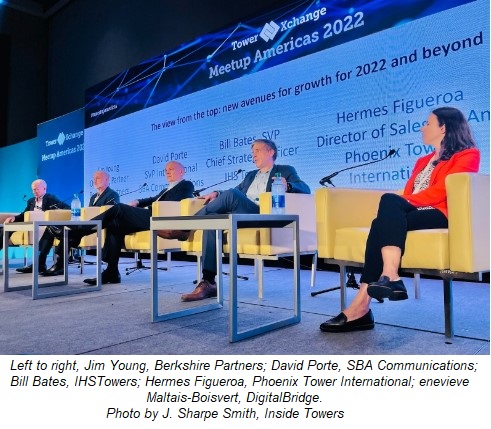Exclusive TowerXchange Coverage
The rise in inflation and increasing interest rates will have a profound effect on the tower industry, introducing changes to its cost structure, according to a panel at TowerXchange Meetup Americas 2022, held this week in West Palm Beach, FL.
The core of the tower business is that it is cheaper for its MNO tenants to share its infrastructure, according to David Porte, Senior Vice President, International Strategy and Business Development, SBA Communications, because the tower industry’s cost of capital is lower than the MNO’s. On the positive side, rising interest rates enhance that value proposition.
“Rising interest rates are going to put pressure on our customers to share more infrastructure, because to build their own towers now costs substantially more,” Porte said during ‘The View From the Top: New Avenues for Growth in Latin America for 2022 and Beyond.’
However, tower companies themselves will face new pressures because of rising interest rates, Porte said. Because investors have seen their cost of capital go up, they will demand a higher return on investment from the tower company. “This translates to a huge amount of pricing pressure on the tower company when it does a new build,” Porte said. “You’ve got to do it cheaper. You actually may have to charge more, because your required returns for your investors have gone up.”
The size of multiples in tower sales may also downsize. When people bid for tower portfolios, the prices for those have to go down, because the cost of capital for those companies acquiring towers has gone up, according to Porte. He predicted the new economic situation is here to stay for a while.
“There is a fundamental shift in the tower industry from a financial standpoint that has been caused by a knock down from COVID that turned into inflation,” he said. “So, you either have to wait it out and hope that cost of capital goes down again sometime in the future, or you’ve got to squeeze your own business, cut your costs to build, and bid less for tower portfolios, because your required returns are going up.”
Bill Bates, Senior Vice President and Chief Strategy Officer, IHS Towers, noted that tower companies have the advantage of price increases built into tenant leasing contracts, while MNOs’ ARPUs are static, even in times of rising inflation. He suggested tower companies work with the MNOs on pricing. “If our customers are hurting, we need to figure out ways to deal with that and help them,” he said. “We can’t just stand there and say it’s all on you.”
In order to reduce opex costs, SBA Communications closely watches the data coming from its cell sites. It also uses drones to keep an eye on the condition of its tower assets. “We need to offer the benefits of that efficiency on to our customers in the way we approach pricing. The more efficient we are, the better partner we can be to our tenants,” Porte told Inside Towers after the panel session.
By J. Sharpe Smith, Inside Towers Technology Editor





Reader Interactions